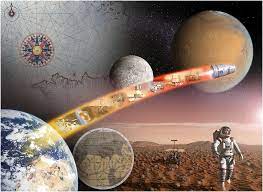
SPACE ODYSSEY
The concept of a space odyssey has long been a source of fascination and inspiration for humanity. The very notion of venturing into the unknown, exploring distant galaxies, and seeking answers to the profound questions about the universe has captivated our imaginations for generations. This essay delves into the significance of space programs, the importance of space exploration in today’s world, the International Space Station (ISS), and the potential impact of privatization on the Indian space sector.
I. Why Space Programs Are Important
- Advancements in Science and Technology: Space programs drive innovations in science and technology, pushing the boundaries of what is possible. From materials science to telecommunications, many everyday technologies have roots in space research.
- Understanding Our Universe: Space exploration enables us to unravel the mysteries of our universe, answering fundamental questions about the origins of life, the nature of celestial bodies, and the existence of extraterrestrial life.
- Benefits to the country – Budgetary Considerations:
- In 2021, the global space industry was estimated to be worth over $400 billion.
- NASA’s budget for 2021 was approximately $25.2 billion, making it one of the largest space agencies in the world.
- Earth’s Protection: Monitoring space is crucial for detecting and mitigating potential threats like asteroids or comets that could impact Earth. Space agencies play a pivotal role in tracking such celestial objects.
- International Collaboration: Space programs foster international cooperation, bringing nations together to work on complex projects, transcending geopolitical boundaries, and promoting peaceful relations.
For instance – * The International Space Station (ISS) is a prime example of international cooperation in space exploration. It involves space agencies from the United States (NASA), Russia (Roscosmos), Europe (ESA), Japan (JAXA), and Canada (CSA).
The ISS has hosted astronauts from more than 18 countries and has conducted over 3,000 experiments since its inception. *
II. Reasons Space Exploration Is More Important Than Ever
- Climate Change and Earth Monitoring: With the escalating challenges posed by climate change, space exploration satellites provide essential data for monitoring environmental changes and predicting natural disasters.
- Resource Scarcity: As Earth’s resources become scarcer, space exploration offers the possibility of mining asteroids and celestial bodies for valuable minerals, water, and even fuel.
III. All about INTERNATIONAL SPACE STATION –
The International Space Station (ISS) is a remarkable space station and laboratory that orbits Earth and serves as a hub for scientific research, international collaboration, and human exploration of space. Here’s all you need to know about the ISS:
- Launch and Assembly:
- The station’s construction started in 1998 with the launch of the Russian module Zarya. Since then, numerous modules and components have been added in a complex assembly process.
- Orbit and Size:
- The ISS orbits Earth at an altitude of approximately 420 kilometers (260 miles) and travels at a speed of about 28,000 kilometers per hour (17,500 miles per hour).
- It is one of the largest human-made structures in space, with a mass of over 420,000 kilograms and a total pressurized volume equivalent to a Boeing 747.
- International Collaboration:
The ISS is a testament to international cooperation in space exploration. It brings together space agencies from different countries and regions to work on a common scientific and engineering endeavor.
The station’s partnership is governed by international agreements, and each participating agency contributes modules, resources, and personnel.
Research and Experiments:
The primary purpose of the ISS is to conduct scientific research and experiments in a microgravity environment.
Research on the ISS covers a wide range of fields, including biology, physics, astronomy, materials science, and Earth sciences. It has led to advancements in medicine, technology, and our understanding of fundamental science.
IV. Real Space Odysseys
- The Apollo Program:
- The Apollo missions, initiated by NASA in the 1960s, represent one of the most iconic space odysseys in history. Apollo 11, in particular, marked humanity’s first steps on the Moon, with Neil Armstrong’s famous words, “That’s one small step for man, one giant leap for mankind.”
- Exploration of Mars:
- Ongoing missions to Mars, such as the rovers Spirit, Opportunity, Curiosity, and Perseverance, have brought us closer to understanding the Martian landscape and the potential for past or present life on the Red Planet.
- The Voyager 1 and Voyager 2 spacecraft, launched in the 1970s, continue their space odyssey, venturing into interstellar space and sending back valuable data about our solar system’s outer planets and beyond.
V. Privatization of the Indian Space Sector
- The Indian space sector has traditionally been dominated by the Indian Space Research Organisation (ISRO), a government agency.
- Privatization initiatives, like the Indian National Space Promotion and Authorization Center (IN-SPACe), aim to involve private players in space exploration, satellite manufacturing, and space-based services.
- Privatization is expected to foster competition, reduce costs, and accelerate technological innovation in the Indian space sector.
- It may also open up opportunities for international collaboration and commercial partnerships, potentially making India a key player in the global space industry.
Conclusion
In conclusion, space exploration is not just a matter of curiosity; it is a crucial endeavor with far-reaching implications. Space programs expand our knowledge, address pressing global challenges, and offer hope for the future. The International Space Station exemplifies international collaboration, while privatization in the Indian space sector could transform the landscape of space exploration. As we continue this space odyssey, humanity is poised to reap the benefits of venturing into the final frontier.
By: Palak Verma
Write and Win: Participate in Creative writing Contest & International Essay Contest and win fabulous prizes.


